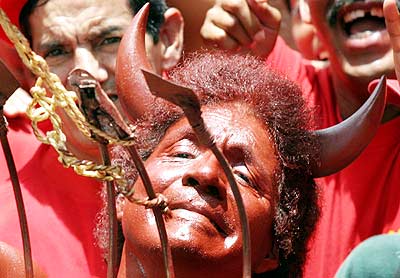Crackdown in Venezuela: Red Tide Rising
From The Economist print edition

Nov 4th 2004 | CARACAS | Having consolidated a near-total grip on power, Hugo Chávez is preparing a set of laws to repress many forms of dissent. JUST last August, after months of unrest and an attempted coup, 4m Venezuelans voted against Hugo Chávez in a recall referendum, more than had voted him in as president in 2000. Yet he won the referendum, and has now completed a stunning turnaround. Local elections on October 31st left his allies controlling 20 of the country's 23 states, plus Caracas, the capital, and they looked likely to bag the state of Carabobo too after the completion of a disputed recount.
No elected leader of the country has ever wielded such power. With a majority in parliament, a tightening grip on the judiciary, the unquestioning loyalty of the military high command and a seemingly endless flow of revenues thanks to high oil prices, the “red tide” that the self-styled revolutionary predicted, referring to his own party colours, is now lapping around the necks of his opponents.
After their referendum defeat, the two dozen anti-Chávez parties could not agree on a common electoral strategy. In some regions they competed against each other, virtually guaranteeing a chavista victory. A commission of experts set up to analyse their allegations of fraud called for voter abstention, compounding the damage. Virtually the only survivors of stature are Manuel Rosales, governor of the far-western state of Zulia, and a couple of young mayors from the fledgling Justice First party, whose base is Caracas and the adjoining state of Miranda.
What will Mr Chávez do with all this power? Part of the answer lies in a set of repressive laws, currently in the legislative pipeline, which critics say will outlaw most forms of dissent and severely restrict freedom of expression. First in line is a radio and TV bill ostensibly aimed at protecting children by curbing violent and sexually explicit content. But its vague wording will, for example, allow the government to suspend transmission or, ultimately, withdraw a licence, for content which is “contrary to the security of the nation”. Already, private TV stations which have been fierce critics of Mr Chávez are showing signs of self-censorship.
Then there is the partial reform of the penal code, which would outlaw virtually every form of protest the opposition has attempted over the past three years. “Intimidating” a senior public official (for example, by banging pots and pans outside his or her house, a popular form of protest) would carry a sentence of three to eight years in jail. Causing panic by spreading “false information”: two to five years. Promoting “disobedience”, even in private: up to six years behind bars.
Article 350 of the 1999 constitution, drafted by the chavistas themselves, enshrines the right to disobey a government that undermines human rights. But a proposed terrorism law would turn many forms of civil disobedience, such as blocking streets, into terrorist acts, with correspondingly severe penalties. And a national police bill would put control of all local police forces, in effect, into the hands of the interior ministry.
The government has already begun to harass dissidents. Leading members of Súmate, an NGO which amounts to an opposition elections unit, face jail terms of up to 16 years. Their alleged crime is to have conspired with a foreign power—the United States—to overthrow the government. Súmate accepted a grant from the National Endowment for Democracy, which is funded by America's Congress and which, prosecutors allege, is a front for the CIA. A neutral judge might well throw the case out. Unfortunately, judges who defy the government tend to lose their jobs; most have only provisional positions. And the supreme court, already largely pro-Chávez, is to be expanded from 20 to 32 justices, who will be appointed by the pro-Chávez majority in parliament.
An even clearer case of distortion of justice is that of General Francisco Usón, a former finance minister in Mr Chávez's government, who was jailed last month for five-and-a-half years by a military tribunal for allegedly slandering the armed forces. The general had offered a technical opinion on television, as a combat engineer, on the workings of a flame-thrower, in the context of press allegations that one had been used on soldiers in a punishment cell. Two of the soldiers died, but seven months later no one has been charged, much less sentenced, for their deaths; the only person in jail is General Usón. The defence minister, General Jorge Luis García Carneiro, minces no words when asked about the case. Anyone, he says, civilian or military, who insults the armed forces can expect similar treatment. Viva la revolución.
send this article to a friend >>
